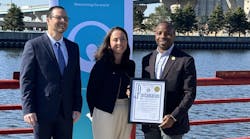A groundwater storage project that ultimately will provide up to 1.4 billion gallons for the Long Beach area during dry years became the first in a series of five Southland projects to receive statewide bond funds granted to the Metropolitan Water District of Southern California.
Metropolitan Chief Executive Officer Ronald R. Gastelum joined officials from the city of Long Beach and Carson-based Central Basin Municipal Water District in signing a 25-year agreement for the storage project in the aquifer underlying the city. The project will receive $4.5 million of the $45 million from Proposition 13 that Metropolitan was given by the state to help develop such groundwater storage programs in Southern California.
"This partnership demonstrates a fundamental enhancement in Metropolitan's resource management strategy by focusing on projects that store water when supplies are plentiful for times when they are not," Gastelum said. "Every drop of water stored by this project frees up an additional drop of water for the rest of the region during dry times.
"Programs like this are responsible for our region's dependable water supply, even in this dry year, and will help us provide continued reliability over the next 20 years," Gastelum said.
The project, approved by Metropolitan's board of directors last month, will allow Metropolitan, in conjunction with Long Beach and Central Basin to store up to 13,000 acre-feet of water in the Long Beach area during wet periods and withdraw 4,333 acre-feet per year during dry spells, droughts or emergencies. (An acre-foot is about 326,000 gallons, enough water for a typical Southern Californian's use in and around their home for two years.)
"This project will hopefully serve as a model for other projects throughout the area," said Kevin L. Wattier, general manager of Long Beach's Water Department. "This is the kind of environmentally friendly project that will help secure water for Long Beach and the rest of the Southland."
The project calls for two separate wells in the city's Heartwell and Wardlow parks to be refurbished and two additional wells, which can both inject and extract water, to be constructed. Construction of the new wells is expected to begin later this summer.
"Not only is this project a good test of the value of conjunctive use as part of an overall Southern California water management plan, it shows the benefit of Metropolitan's member agencies working together towards a common goal," said Darryl Miller, General Manager of Central Basin Municipal Water District. "By joining with Long Beach, the five partner agencies are able to develop and study a working program and incorporate it into a basin-wide water supply strategy."
To learn more about Metropolitan and the role groundwater storage projects like Long Beach's will play in Southern California's water future, visit MWD's Web site at www.mwdh20.com.The Metropolitan Water District of Southern California is a cooperative of 26 cities and water agencies serving 17 million people in six counties. The district imports water from the Colorado River and Northern California to supplement local supplies, and helps its members to develop increased water conservation, recycling, storage and other resource-management programs.
Source: Metropolitan Water District of Southern California

